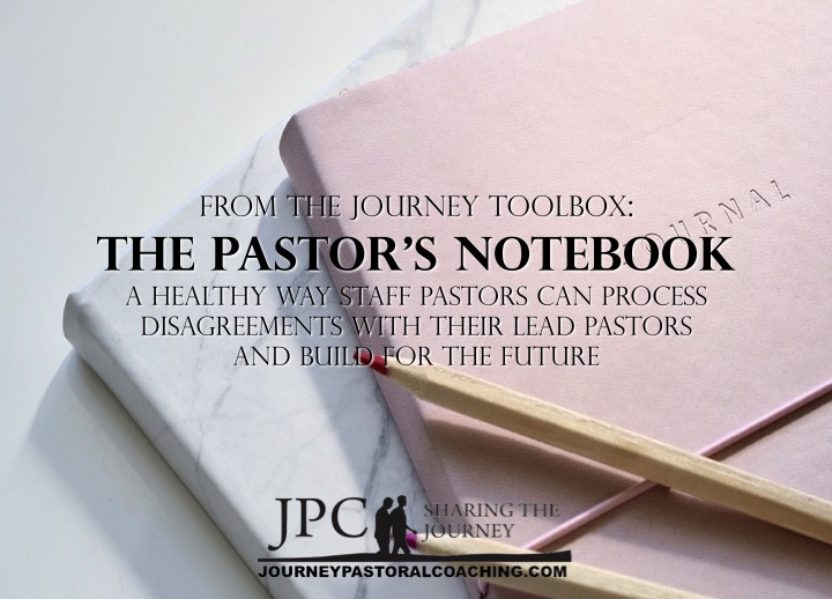The Pastor’s Notebook
During my early ministry years I was privileged to serve under two lead pastors. These were most positive experiences for me and I learned a great deal from these godly men. I’m glad to say that I enjoyed close personal relationships with them as well.
In teaching me about ministry, my pastors were willing to answer my questions about their philosophies and approaches. And because I was a minister of the Gospel, I had my own ideas pastoral ministry. To their credit, my pastors encouraged this: they encouraged me to think for myself. They were even more than willing to consider my ideas.
My lead pastors even gave me freedom to carry out my ministry as I thought best – within proper guidelines, of course. The few limits they placed on me were necessary and wise. I knew this to be true then, but I have come to know it even more over the years.
My lead pastors taught me so much. I thank God for them and for the experience of serving under their leadership. Given the chance to go back and do it all over again, I wouldn’t hesitate to do just that. I hope they would say the same of me.
But as I say, I had my own ideas about how I would do things when I became a lead pastor – and my ideas did not always match those of my lead pastors. There were differences in philosophy and in approach. And rightly so: an effective pastoral staff member is not a mind-numbed, head-nodding drone. He is a Spirit-led, creative, “here’s a fresh thought” leader. As a lead pastor, I had always had staff members who had their own ideas and I wouldn’t have had it any other way. It’s helped us be a better pastoral team for our churches.
NOTE: For an intriguing look into a “leader-among-leaders” approach, read “Creativity, Inc,” the fascinating story of Pixar and how its senior execs formed the dynamic leadership philosophy and approach that brings out the very best in its diverse but completely united group of leaders.
A CHOICE
But this approach does bring a challenge for the staff pastor whose approach aren’t always the same as her leader. That challenge is expressed in a choice: will I serve God or serve myself?
While serving as a staff pastor and my pastor’s ideas didn’t line up with mine, I could have:
. . . complained to myself that he was wrong, wrong, wrong and I was right, right, right;
. . . infected pastoral staff meetings with my negative attitudes;
. . . protested to the board;
. . . surreptitiously sought support for my point of view among members of the church.
All in the name of serving God and the church. Of course.
Or, given that my pastor was not teaching false doctrine or harming people, I could support him and his ministry.
I could faithfully and enthusiastically support my pastor in word, attitude, and deed. After all, he was older and more experienced than me. And God had called him, not me, to serve as lead pastor of that church – I was his assistant. Therefore, job one in my God-given job description was to help carry out the ministry of my senior pastor. If and when I could no longer do that, it was my God-given responsibility not to turn the church upside down (citing Jesus in the temple as my justification), but to bless the church and my pastor by peacefully leaving and giving my place to someone who could faithfully fill the role of assistant.
While some staff pastors do not choose to do so, most are able to support their lead pastors even when they do not agree with their approach. Still, for supportive staff pastors, there are still the occasional, “He’s wrong and I’m right” moments when they say to themselves, “When I’m the lead pastor, I will do this differently.”
So, what should a staff pastor do when he or she disagrees with the senior pastor on ministry and leadership matters?
THE PASTOR’S NOTEBOOK
Again, if a staff pastor is no longer able to fully and enthusiastically support the lead pastor’s ministry, this is a “handwriting on the wall” moment: it’s time to leave. Quietly. Humbly. As you go, bless the pastor and the church in every way possible. This is the way of Jesus, the Great and Good Shepherd under whom the staff pastor ultimately serves.
But if you disagree with your lead pastor and his approach, you don’t have to leave. You really can support him or her fully and with integrity as you have your own ideas. Here’s a healthy way to do just that.
An idea I often share with staff pastors is “The Pastor’s Notebook.” Kept digitally or on paper, The Pastor’s Notebook is an ongoing, never completed personal journal on pastoral ministry. It’s a personal, self-written textbook on pastoring.
The Pastor’s Notebook works this way.
Let’s imagine the following scenario: a funeral. A member of the church passes away. The family asks your lead pastor to officiate. As a staff pastor and friend of the deceased you go with the pastor to the family home, attend the visitation, and assist in the funeral service. You watch your lead pastor as he provides pastoral care to the grieving family in their home, at the visitation, and at the funeral home. Not as an expert or judge, but as a learner, you observe and take mental notes as your senior pastor ministers.
From time to time you may say to yourself: “I would have done that differently,” or “I would have done it this way,” or “I need to think about this and how I would do it.” Each of these thoughts is a potential entry in your Pastor’s Notebook. Without being critical or disparaging, make brief notes on the event, noting the date and place for memory’s sake. Note how you think you will carry out that ministry when your turn comes as a lead pastor. Most importantly, don’t forget to explain why. It’s best to do this immediately after the event while it is still fresh in your heart and mind.
The Pastor’s Notebook is not a record of your complaints and against your lead pastor. If it descends into this, throw away your notebook and either start over or recognize that it’s time for you to move on to another church. This is not a tool for examining your lead pastors’ person, but for exploring your ministry. It is intended to be a learning tool with the microscope not on your pastor, but on you, one that says, “Recognizing my ongoing need to learn and even to revisit what I think I know, here is how I think I would have done that.”
Be sure to add tags for indexing and searching in the future. If using a computer, filing and finding it later is simple. If using paper, though more complicated, you can partition your journal or notebook so as to make finding topics easy in the future.
This simple tool serves the young staff pastor well in several ways:
1. It helps the staff pastor focus on learning;
Rather than simply going from service to service or watching the ministry world go by, the minister focuses on events, people, actions, etc., and looking, he or she interprets, analyzes, and forms new ideas – ideas that are not set in concrete, but open for a lifetime of modification, improvement, and even correction.
2. It helps the staff pastor crucify any drift toward a critical spirit
Staff pastors sometimes internalize their differences with lead pastors. Internalized differences can become infections of bitterness and resentment not only toward the pastor, but the church and the ministry. To write positively about differences is not just letting off steam, but a constructive exercise in offering ourselves to God:
Search me, O God, and know my heart;
Try me, and know my anxieties;
And see if there is any wicked way in me,
And lead me in the way everlasting. (Psalm 139.23-24)
3. It forms a foundation for later ministry as a lead pastor;
This is the ultimate goal of the exercise of keeping a Pastor’s Notebook.
4. It becomes a developmental thread;
This notebook is never completed. It is an ongoing, internal processing of our pastoral ministry, one that will develop over the years (even after we are lead pastors!)
5. It keeps us connected to our first years in ministry.
During our early ministry years, our ideas are fresh and even idealistic – attributes all too often ground away by years in ministry. Our Pastor’s Notebook can help us remember and feel the fire again. And, as a benefit to the staffs we pastor, our Pastor’s Notebook can remind us that once upon a time we were young staff pastors too.
A FINAL THOUGHT
My Pastor’s Notebook has served me well over the years. Some of my entries, ideas about which I was very passionate at the time, have changed due to experience or the unique ministry setting in which I served. Other entrees in my Pastor’s Notebook have not only remained but have been underlined, highlighted, and notated as lasting ideas that fully developed and became a vital part of my life and ministry.
Do I still keep my Pastors Notebook? Absolutely! Over all my years as a staff pastor, lead pastor, missionary, campus pastor, and now pastoral coach, I have taken notes on the pastors I have worked with and the pastors I observed. I continue to agree and disagree with my colleagues, and as a result, these men and women of God continue to help me grow as a pastor of pastors and missionaries today. You will not find on any page of my Pastor’s Notebook that I am a better or more qualified pastor than my colleagues. You will see only that I have observed their ways, and that they have helped me better understand what it is to be a pastor, and so, how to more effectively pastor God’s people. And yes, I still come around to others’ way of thinking from time to time: My Pastor’s Notebook continues to be an ongoing, never ending, always-in-process personal textbook on pastoral ministry.
Whatever your age or station, I recommend that you begin your Pastor’s Notebook today. This is especially true if you are a young staff pastor. Here’s a thought for you: you might have even disagreed with something in this article – you might have said to yourself, “No, I think I would do it this way.” If so, go ahead! Make it your first entry in your own Pastor’s Notebook.
___________________
NOTE: Journey Pastoral Coaching provides pastoral coaching to Millennial ministers.
Saddled with large student debt, just beginning to set up homes and start families, and serving in low paying first and second positions, Millennials are those who most desire but can least afford to pay for pastoral coaching.
So we offer it to them at NO COST: Our members do not PAY for coaching; they EARN it.
We are able to do so through the faithful and generous gifts of friends who want to see young leaders not only enter the ministry, but remain in the ministry. If you or your church would like to help Millennial ministers in 21 US states and 5 nations build strong for a lifetime in ministry, please click here to contact us by email or to support Journey monthly or with your one-time gift. Thank you.
We also invite you to click and subscribe to our twice-monthly blogs at journeypastoralcoaching.com
“In the early years when I was becoming a pastor, I needed a pastor.”
Eugene H. Peterson, The Pastor: A Memoir



